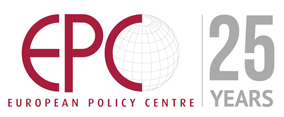(September 29, 2023, European Policy Centre – EPC)
Speakers:
- Alberto Gago, International & EU Digital Affairs Advisor, Cabinet of Spain’s State Secretary for Digital and AI
- Mark Dempsey, Senior Advocacy Officer, Article19
- Paul Nemitz, Principal Adviser on the Digital Transition, DG JUST, European Commission
- Thibaut Kleiner, Director, Policy Strategy and Outreach, DG CONNECT, European Commission
- Trinidad Sanoa, First Secretary, Mission of Chile to the European Union
- Rafael Yuste, Professor of Biological Sciences and Neuroscience, Co-Director of the Kavli Institute of Brain Science, and Director of the NeuroTechnology Center (NTC) at Columbia University
Moderator:
- Andrea García Rodríguez, Lead Digital Policy Analyst, European Policy Centre
The aim of the conference organized by EPC was to explore the nature of neurotechnologies, their evolution, and how to safeguard individuals’ fundamental rights amidst these technological advancements. This conference aimed to strike a balance between the imperative to regulate and the necessity to promote these new technologies.
What are Neurotechnologies?
According to the professor of neurosciences Rafael Yuste, neurotechnologies encompass devices and methods for measuring or influencing brain activity. They include electrical, magnetic, chemical, and nanotechnological approaches. Given that the human brain governs all human activities, monitoring or affecting its functions could potentially alter human behavior. This raises concerns about the ability to decode and manipulate the brain. Professor Rafael Yuste illustrated these concerns with successful experiments, including one at Columbia University where artificial images were implanted into rats’ brains to modify their behavior.
Neurotechnologies are now omnipresent, especially in the medical field. Professor Rafael Yuste highlighted their importance, echoed by Thibaut Kleiner, who is a member of DG CONNECT at the European Commission. Neurotechnologies have advanced significantly through initiatives like the BRAIN project, launched during the Obama administration to explain brain disorder mysteries, such as Alzheimer’s and Parkinson’s diseases. Recent technological strides have enabled remarkable medical progress, such as implanting neurotechnologies in the brains of blind individuals to restore their sight and facilitating mobility for others. It’s essential to recognize that neurotechnologies offer both benefits and potential dangers.
Do We Need Neurotechnology Governance?
However, the question arises: should we establish rules to counterbalance the immense power of neurotechnologies? According to Alberto Gago, representing the Cabinet of Spain’s State Secretary for Digital and AI, and Trinidad Sanoa, First Secretary of the Mission of Chile to the European Union, the answer is unequivocal: we must safeguard against potential abuses and create a comprehensive framework for neuro rights. These technological advancements raise ethical and societal questions, which necessitate understanding to protect fundamental human rights, including mental privacy and freedom. The brain is more than a mere organ; thus, we must establish a higher level of protection. The Spanish Presidency, as highlighted by Alberto Gago, intends to delve deeper into this subject during its term, which extends until the end of December.
Trinidad Sanoa’s contribution was particularly important, as Chile is a pioneer in the field of neuro-rights. In 2021, the Chilean Senate unanimously passed a bill amending the Constitution to protect “brain rights” – “neuro-rights” – making Chile the first nation to include such rights in its Constitution. This decision highlighted potential abuses arising from the current legal vacuum. The bill aims to safeguard human activity and information derived from it; a project that Trinidad Sonoa views as crucial for preserving human dignity. Various panelists stressed the need to formulate a legal framework that accommodates future technologies yet to be invented. Paul Nemitz, from DG JUST at the European Commission, strongly advocated for this approach, emphasizing the importance of global and broad legislation to prevent each technological advance from encountering barriers.
Regarding global governance, Trinidad Sanoa also emphasized the urgency of developing a common vocabulary to foster a global understanding of the subject. Chile is actively promoting this at the Council of the EU and UNESCO levels, with the recent approval of a recommendation on the ethical aspects of AI.
A Balanced Approach: Balancing Regulation and Promotion
In conclusion, all panelists agreed on the notion that regulation should be undertaken globally to prevent exclusion of certain states on this critical issue. Thibaut Kleiner also rightly stressed Europe’s necessity to develop this technology to ensure independence from countries that do not share European democratic values. For him, as well as others, slowing down technological progress is inconceivable. Instead, we must develop and utilize technologies that align with our values. This raises questions about competitiveness. Alberto Gago, Mark Dempsey, and Thibaut Kleiner underscored the need to engage in dialogue with the European and partner industries to establish ethical design principles. Given our limited understanding of just 10% of the brain, providing unrestricted access to companies would be senseless. One phrase stood out: “We need to engage in this race because others are already doing so.”
Video recording of the event:

